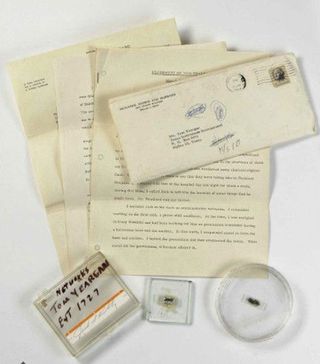
Historic Microchip Fails to Sell at NYC Auction

An early piece of tech history — a microchip prototype used by Nobel Prize-winning inventor Jack Kilby to demonstrate how electronic circuits could be placed on a single, tiny chip — failed to sell at auction today (June 19), despite much pre-sale hype.
The prototype, built in 1958, had an estimated sale price of up to $2 million, but fetched a highest bid of only $850,000 at today's auction, reported Bloomberg. The bid did not reach the so-called reserve price set by the sellers and auction house prior to the sale.
"Despite much pre-sale interest, bidding did not reach the reserve, so the item did not find a buyer today," Sung-Hee Park, a spokesperson for Christie’s, the auction house handling today's sale in New York City, told Bloomberg.
Christie's said the prototype chip birthed the modern computing era by helping, in particular, to reduce the massive size and cost of early computing power. Kilby went on to win the Nobel Prize in physics in 2000 for his invention of the integrated microchip. The renowned inventor died in 2005 at the age of 81.
Park said the historic microchip could hit the auction block again, or be sold privately, in the future, according to Bloomberg.
Follow Denise Chow on Twitter @denisechow. Follow Live Science @livescience, Facebook & Google+.
Sign up for the Live Science daily newsletter now
Get the world’s most fascinating discoveries delivered straight to your inbox.

Denise Chow was the assistant managing editor at Live Science before moving to NBC News as a science reporter, where she focuses on general science and climate change. Before joining the Live Science team in 2013, she spent two years as a staff writer for Space.com, writing about rocket launches and covering NASA's final three space shuttle missions. A Canadian transplant, Denise has a bachelor's degree from the University of Toronto, and a master's degree in journalism from New York University.
Most Popular

